206 scholarly books by Arc Humanities Press and 25
have author last names that start with S
206 scholarly books by Arc Humanities Press and 25
206 scholarly books by Arc Humanities Press
25 have author last names that start with S have author last names that start with S
25 have author last names that start with S have author last names that start with S
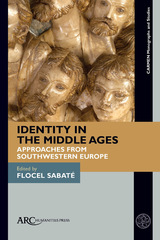
Identity in the Middle Ages
Approaches from Southwestern Europe
Flocel Sabaté
Arc Humanities Press, 2021
This book places identity at the centre of a project to better understand medieval society. By exploring the multiplicity of personal identities, the ways in which these were expressed within particular social structures (such as feudalism), and their evolution into formal expressions of collective identity (municipalities, guilds, nations, and so on) we can shed new light on the Middle Ages. A specific legacy of such developments was that by the end of the Middle Ages, a sense of national identity, supported by the late medieval socio-economic structure, backed in law and by theological, philosophical, and political thought, defined society. What is more, social structures coalesced across diverse elements, including language, group solidarities, and a set of assumed values.
[more]
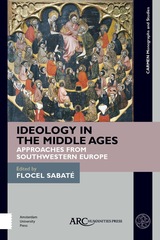
Ideology in the Middle Ages
Approaches from Southwestern Europe
Flocel Sabaté
Arc Humanities Press, 2019
<div>This interdisciplinary volume sets out to illuminate medieval thought, and to consider how the underlying values of the Middle Ages exerted significant influence in medieval society in the West.</div><div>The book situates the Christian Church in the West as a framing ideology of the Middle Ages, and considers ideology from four angles: as a means of defining power; as a way of managing power; ideology as an influence on daily living and societies; and the ways in which ideology associated with the Middle Ages continues to influence understandings of past and present. A focus on southern European case studies has been chosen as a means of enriching and complicating study of the Middle Ages.</div>
[more]
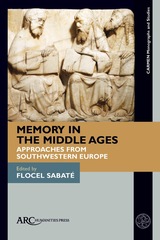
Memory in the Middle Ages
Approaches from Southwestern Europe
Flocel Sabaté
Arc Humanities Press, 2020
Memory was vital to the functioning of the medieval world. People in medieval societies shared an identity based on commonly held memories. Religions, rulers, and even cities and nations justified their existence and their status through stories that guaranteed their deep and unbroken historical roots.
The studies in this interdisciplinary collection explore how manifestations of memory can be used by historians as a prism through which to illuminate European medieval thought and value systems. The contributors draw the link between memory and medieval science, management of power, and remembrance of the dead ancestors through examples from southern Europe as a means of enriching and complicating our study of the Middle Ages; this is a region with a large amount of documentation but which to date has not been widely studied.
[more]
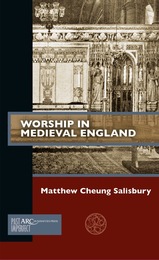
Worship in Medieval England
Matthew Cheung Salisbury
Arc Humanities Press, 2018
<div>The study of medieval liturgy can tell us a great deal not only about the worship of the church, but also about the people who practised it. However, existing scholarship can be problematic and difficult to use.</div><div>This short book aims to unsettle the notion that liturgiology is a mysterious, abstruse, and monolithic discipline. It challenges some scholarly orthodoxies, hints at the complexity of the liturgy and shows that it needs to be examined in new and different ways.</div>
[more]
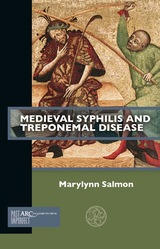
Medieval Syphilis and Treponemal Disease
Marylynn Salmon
Arc Humanities Press, 2022
Leaders in the field of paleopathology have found enough evidence to prove that treponematosis, including syphilis, existed in ancient and medieval Afro-Eurasia, settling a decades-long debate. Yet documentary and artistic evidence to support this important work remains scarce. After summarizing the confirmed cases of treponematosis detected to date, this book turns to contemporary accounts about the death of the English king, Edward IV, that strongly indicate syphilis as the cause. It then considers further evidence suggesting contemporary awareness that elites tended to experience the disease more severely than commoners, and includes numerous examples from medical treatises and artworks that are highly suggestive that both endemic and venereal treponematosis (bejel and syphilis) were present in late medieval Europe. In doing so, the author hopes to spark a conversation not only about the existence of the disease in various places and times, but also its wider impact on premodern society and culture.
[more]
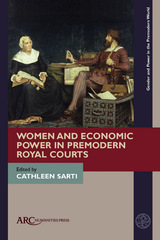
Women and Economic Power in Premodern Royal Courts
Cathleen Sarti
Arc Humanities Press, 2020
Premodern kings and queens had splendid courts to show their God-given power. But where did the money for these come from? Following the money trail back often leads to unexpectedly savvy women who knew how to deal with money, and how to manage huge estates, treasuries, or accounts. This volume focuses on the economic and financial dimensions of the premodern royal court, and especially on the women using money as an instrument of power. Methodological and theoretical reflections on an economic history of royal courts frame case studies from medieval England to early modern Denmark and the Holy Roman Empire. Empresses and queens, but also mistresses and favourites are discussed, including considerations of their spheres of influence, their financial strategies and means, and their successes and failures.
[more]
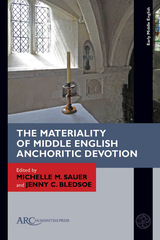
The Materiality of Middle English Anchoritic Devotion
Michelle M. Sauer
Arc Humanities Press, 2021
Anchorites and their texts, such as Ancrene Wisse, have recently undergone a reevaluation based on material circumstances, not just theological import. The articles here address a variety of anchoritic or anchoritic-adjacent texts, encompassing guidance literature, hagiographies, miracle narratives, medical discourse, and mystic prose, and spanning in date from the eighth through the fourteenth centuries. Exploring reclusion and materiality, the collection addresses a series of overlapping themes, including the importance of touch, the limits of religious authority, and the role of the senses. Objects, metaphorical and real, embodied and spiritual, populate the pages. These categories are permeable, with flexible and porous boundaries, demonstrating the conflation of ideas, concepts, and manifestations in medieval materiality. In fact, the permeability of these categories demonstrates how materiality can reshape our approach to medieval texts. It leaves room for directions for future study, including the application of material analysis to previously unstudied objects, spaces, and literary artifacts.
[more]
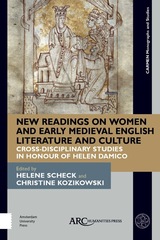
New Readings on Women and Early Medieval English Literature and Culture
Cross-Disciplinary Studies in Honour of Helen Damico
Helene Scheck
Arc Humanities Press, 2019
<I>New Readings on Women and Early Medieval English Literature and Culture</I> showcases current and original scholarship relating to women in Early Medieval English culture and in Early Medieval English studies and promises to stimulate new work in those areas. Recognizing the plasticity of gender structures, roles, and relations in Early Medieval English literature and culture as well as within the modern discipline of Early Medieval English Studies, the essays reveal pluralities of gender bequeathed to us and encourage us to rethink power/gender dynamics in our present moment.
[more]
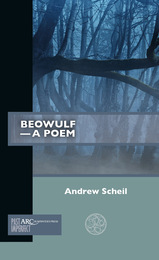
Beowulf—A Poem
Andrew Scheil
Arc Humanities Press, 2022
Why should anyone, aside from specialist historians and philologists, read Beowulf? This book presents a passionate literary argument for Beowulf as a searching and subtle exploration of the human presence. Seamus Heaney praised Beowulf as "a work of the greatest imaginative vitality": how is that true? The poem's current scholarly obsessions and its popular reception have obscured the fact that this untitled and anonymous 3182-line poem from Anglo-Saxon England is a powerful and enduring work of world literature. Beowulf is an early medieval exercise in humanism: it dramatizes, in varied and complex ways, the conflict between human autonomy and the "mind-forg'd manacles" of the world. The poem is as relevant and moving to any reader today as it was during the early Middle Ages. This book serves both as an invitation and introduction to the poem as well as an intervention in its current scholarly context.
[more]

The Institutional Power of Chosŏn Korea's Queen Dowagers
Alban Schmid
Arc Humanities Press, 2024

Princesses Mary and Elizabeth Tudor and the Gift Book Exchange
Valerie Schutte
Arc Humanities Press, 2021
This is the first book to offer a comparison of these two famous Tudor queens as princesses, suggesting that their early lives need to be more closely examined together. It offers a detailed case study of the four extant dedications that Elizabeth Tudor wrote to accompany manuscript translations that she gave to Henry VIII, his then wife, Katherine Parr, and to Elizabeth's brother Edward (VI of England) as New Year’s gifts from 1545 to 1548. Additionally, it seeks to compare Elizabeth with her sister Mary, beginning with pre-accession dedications given to each of them, exploring two of Mary's own translations, moving to their typical patterns of New Year's gift giving, and ending on the textual transmission of their translations that were later published in 1548. It argues that Elizabeth’s dedications to her family, while participating in the tradition of giving books, were unique and in the dedications she intended not only to represent her loyalty but also to stabilize her position within the royal family.
[more]
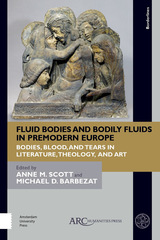
Fluid Bodies and Bodily Fluids in Premodern Europe
Bodies, Blood, and Tears in Literature, Theology, and Art
Anne M. Scott
Arc Humanities Press, 2019
This interdisciplinary collection of essays, containing chapters from specialists in history, art history, medical history, and literature, examines how the intimately familiar language of the body served as a convenient medium through which to imagine and describe transformations of the larger world, both for the better and also for the worse. Its individual contributors demonstrate the myriad ways in which rethinking the human body was one way to approach rethinking the social, political, and religious realities of the world from the Middle Ages until the early modern period.
[more]
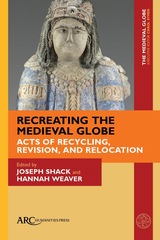
Recreating the Medieval Globe
Acts of Recycling, Revision, and Relocation
Joseph Shack
Arc Humanities Press, 2020
The creative reuse of materials, texts, and ideas was a common phenomenon in the medieval world. The seven chapters offer here a synchronic and diachronic consideration of the receptions and meanings of events and artifacts, analyzing the processes that allowed medieval works to remain relevant in sociocultural contexts far removed from those in which they originated. In the process, they elucidate the global valences of recycling, revision, and relocation throughout the interconnected Middle Ages, and their continued relevance for the shaping of modernity. The essays examine cases in the Arab and Muslim world, China and Mongolia, and the Prussian-Lithuanian frontier of eastern Europe.
[more]
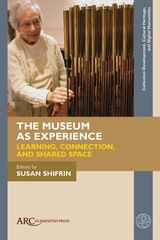
The Museum as Experience
Learning, Connection, and Shared Space
Susan Shifrin
Arc Humanities Press, 2024
Museums have long been viewed as exclusive, excluding, and as antiseptic to intimacy. In the past few decades, however, humanized experiences—cultivated by curators, educators, artists, activists, and marketers alike—have emerged as the reason for being for these cornerstones of community. Such experiences are often possible only in museum settings, where cultural exploration, probing conversation, and safe risk-taking can occur in spaces now becoming sacred through inclusiveness.
This book brings together an interdisciplinary collection of essays examining the kinds of human experiences and interactions that have converted the once-sterile museum into a space of enlivenment and enrichment, as well as physical and emotional well-being. The essays focus for the first time on the uniquely human and humanizing experiences to be found in the collections, programs, exhibitions, and spaces of today’s museums.
[more]
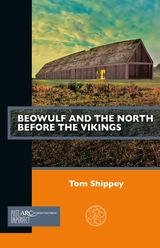
Beowulf and the North before the Vikings
Tom Shippey
Arc Humanities Press, 2022
Ever since Tolkien’s famous lecture in 1936, it has been generally accepted that the poem Beowulf is a fantasy, and of no use as a witness to real history. This book challenges that view, and argues that the poem provides a plausible, detailed, and consistent vision of pre-Viking history which is most unlikely to have been the poet’s invention, and which has moreover received strong corroboration from archaeology in recent years. Using the poem as a starting point, historical, archaeological, and legendary sources are combined to form a picture of events in the North in the fifth and sixth centuries: at once a Dark and a Heroic Age, and the time of the formation of nations. Among other things, this helps answer two long-unasked questions: why did the Vikings come as such a shock? And what caused the previous 250 years of security from raiders from the sea?
[more]
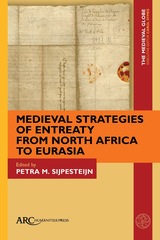
Medieval Strategies of Entreaty from North Africa to Eurasia
Petra Sijpesteijn
Arc Humanities Press, 2024
This volume in The Medieval Globe Books series surveys the distinctive but also shared rhetorical practices that characterize written requests for intercession, support, and patronage across many languages, cultures, and forms of interaction. Examples range from mundane requests to diplomatic negotiations, preserved in a variety of material media: potsherds, papyrus, paper, administrative handbooks, chronicles, and letter collections. Each contribution focuses on one textual sample or corpus of letters, providing new English translations as well as editions of the original texts in cases where no previous edition is available. Together, they represent the textual conventions and innovations of learned and vernacular epistolary traditions from many regions of North Africa and Eurasia, from the eighth to the fifteenth centuries CE.
[more]
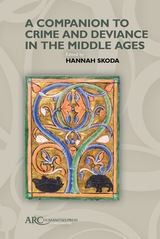
A Companion to Crime and Deviance in the Middle Ages
Hannah Skoda
Arc Humanities Press, 2023
This reference work examines the ways in which some medieval behaviours and identities were categorized as criminal or deviant. It also explores the implications of modern demonization of the Middle Ages. As well as discussing constructions of deviance, this book also explores the behaviours and identities which provoked these labels and processes. The model is one of reciprocity between behaviours and processes of demonisation and criminalisation. Each authoritative essay engages carefully with this approach, examining behaviours, the ways they were demonized, and the relationship between the two processes. The three parts of the volume are centred around forms of discursive and normative power—religious ideologies, political ideologies, and legalism. The authors also explore issues of political discourse, spiritual censure, justice and punishment, and the construction of taboos.
This reference work examines the ways in which some medieval behaviours and identities were categorized as criminal or deviant. It also explores the implications of modern demonization of the Middle Ages. As well as discussing constructions of deviance, this book also explores the behaviours and identities which provoked these labels and processes. The model is one of reciprocity between behaviours and processes of demonisation and criminalisation. Each authoritative essay engages carefully with this approach, examining behaviours, the ways they were demonized, and the relationship between the two processes. The three parts of the volume are centred around forms of discursive and normative power—religious ideologies, political ideologies, and legalism. The authors also explore issues of political discourse, spiritual censure, justice and punishment, and the construction of taboos.
[more]

Medievalisms and Russia
The Contest for Imaginary Pasts
Eugene Smelyansky
Arc Humanities Press, 2024
This new monograph devoted to a detailed exploration of the ways in which the medieval past has been wielded to propagandic effect in Imperial, Soviet, and post-Soviet Russia.
From politicians’ speeches to popular culture, from Orthodox Christianity to neo-paganism, the medieval Russian past remains crucial in constructing national identity, mobilizing society during times of crisis, and providing alternative models of communal belonging. Frequent appeals to a medieval Slavic past, its heroes and myths, have provided—and continue to provide—a particularly powerful tool for animating imperialist and populist sentiments.
This study explores persuasive—and pervasive—recourse to tropes concerned with the Middle Ages in Imperial, Soviet, and post-Soviet Russia, seeking to explain why an often romanticized medieval past remains potent in Russian politics, society, and culture today.
[more]

Medieval History in the Modern Classroom
Using Project-Based Learning to Engage Today’s Learners
Lane J. Sobehrad
Arc Humanities Press, 2022
Teaching medieval history should engage students in the real work of professional medievalists. However, many undergraduate courses rely on instructional strategies that only engage students in rote retention of medieval "stuff" and unsupported writing assignments. With trends in the USA and elsewhere showing declining undergraduate enrollment in the humanities and an increasing number of questions from university administrators regarding the utility of the liberal arts, historians need to reassess how they teach. Project-based learning (PBL) is one approach that may help medieval history instructors offer coursework that is more engaging for today's undergraduate students and provide administrators a clearer picture of the utility of studying the past. The pedagogy of PBL actively engages students in projects reflective of the real work being done by medievalists, allowing instructors to move beyond the traditional narrative found in many undergraduate survey courses. This book provides an overview of PBL theory, methods for incorporating PBL into an undergraduate medieval history course, instructional strategies, scalable assessment formats, and other resources useful for any history classroom.
[more]
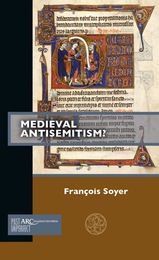
Medieval Antisemitism?
François Soyer
Arc Humanities Press, 2019
In this work, François Soyer examines the nature of medieval anti-Jewish sentiment and violence. Analysing developments in Europe between 1100 and 1500, he points to the tensions in medieval anti-Jewish thought amongst thinkers who hoped to convert Jews and blamed Talmudic scholarship for their obduracy and yet who also, conversely, often essentialized Judaism to the point that it transformed into the functional equivalent of the modern concept of race. He argues that we should not consider antisemitism as a monolithic concept but accept the existence of independent, historical meanings and thus of antisemitisms (plural), including "medieval antisemitism" as distinct from anti-Judaism.
[more]
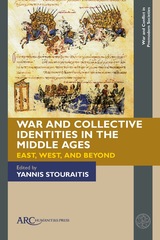
War and Collective Identities in the Middle Ages
East, West, and Beyond
Yannis Stouraitis
Arc Humanities Press, 2023
This book uses sociological perspectives to bring together work on war and identity in the Middle Ages relating to a range of peoples and geographical settings from Europe, the eastern Mediterranean, the Middle East, and Asia. Focusing on the interrelation between ideological practices and group formation, it examines the role of warfare in the emergence and decline of particular social structures, and changing patterns of collective identification. It contributes to the debate on the longue durée development of the phenomena of ethnicity and nationhood by drawing attention to the impact of war on the evolution of various types of polity and visions of community in the Middle Ages. Its use of non-European as well as European exemplars provides a wealth of fruitful comparative material, shedding new light on the relationship between medieval warfare and high-level identities.
[more]
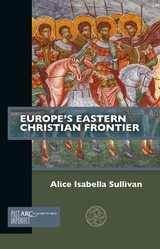
Europe's Eastern Christian Frontier
Alice Isabella Sullivan
Arc Humanities Press, 2024
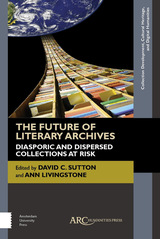
The Future of Literary Archives
Diasporic and Dispersed Collections at Risk
David C. Sutton
Arc Humanities Press, 2018
Literary archives differ from most other types of archival papers in that their locations are more diverse and difficult to predict. The essays collected in this book derive from the recent work of the Diasporic Literary Archives Network, whose focus on diaspora provides a philosophical framework which gives a highly original set of points of reference for the study of literary archives, including concepts such as the natural home, the appropriate location, exile, dissidence, fugitive existence, cultural hegemony, patrimony, heritage, and economic migration.
[more]
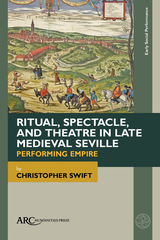
Ritual, Spectacle, and Theatre in Late Medieval Seville
Performing Empire
Christopher Swift
Arc Humanities Press, 2023
From the fall of Islamic Išbīliya in 1248 to the conquest of the New World, Seville was a nexus of economic and religious power where interconfessional living among Christians, Jews, and Muslims was negotiated on public stages. From out of seemingly irreconcilable ideologies of faith, hybrid performance culture emerged in spectacles of miraculous transformation, disciplinary processionals, and representations of religious identity.
Ritual, Spectacle, and Theatre in Late Medieval Seville reinvigorates the study of medieval Iberian theatre by revealing the ways in which public expressions of devotion, penance, and power fostered cultural reciprocity, rehearsed religious difference, and ultimately helped establish Seville as the imperial centre of Christian Spain.
[more]
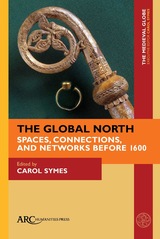
The Global North
Spaces, Connections, and Networks before 1600
Carol Symes
Arc Humanities Press, 2021
When Janet Abu-Lughod sketched the contours of a medieval “world system” in 1989, she located most communication networks in the southern hemisphere. In recent decades, however, new trends in research and new forms of evidence have complicated, enriched, and expanded this picture, geographically and chronologically. We now know that vast portions of the world were interconnected throughout the Middle Ages and, moreover, that the entire circumpolar North was a contact zone in its own right. In this volume, scholars from a range of disciplines explore the boreal globe from the late Iron Age to the seventeenth century, offering fresh perspectives that cross the frontiers of national historiographies and presenting new research on migration, trade, mapping, cultural exchange, and the interactions of humans with their environment.
[more]
READERS
Browse our collection.
PUBLISHERS
See BiblioVault's publisher services.
STUDENT SERVICES
Files for college accessibility offices.
UChicago Accessibility Resources
home | accessibility | search | about | contact us
BiblioVault ® 2001 - 2024
The University of Chicago Press









